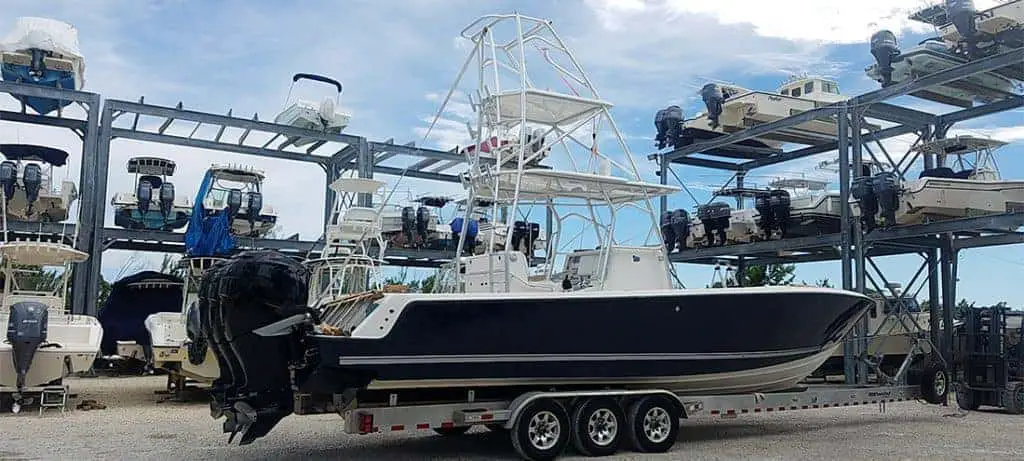Owning a boat is a huge investment and can turn into a really expensive one at that! So it’s not uncommon to want to do everything possible to help protect and keep your boat in tip-top shape! You might be wondering what to do in the winter though. So,
Can Boats Be Stored Outside In The Winter? Yes, boats can be stored outside during any season of the year. You will want to make sure you winterize the engine, as well as the boat. Failure to take care of these key factors can lead to massive and expensive damage to the boat.
Here are all the things that you need to know about how to store your boat outside safely during the winter, and getting it back out next season!
The Differences Between Having The Boat Inside or Outside:
 Your place of residence often dictates whether you store your boat inside or outside during the winters. If you live in some of the upper regions of America or the Midwest. You do not have the choice of leaving your boat at the docks for the winters.
Your place of residence often dictates whether you store your boat inside or outside during the winters. If you live in some of the upper regions of America or the Midwest. You do not have the choice of leaving your boat at the docks for the winters.
The lakes freeze over in the winters, forcing you to take your boat out of the water to protect it from damage. However, if you are lucky enough to live in a place where the lakes don’t freeze over, you have the option of leaving it in the water.
Taking it out of the water and storing it outside in a driveway or boat rack, or storing it inside in a garage or warehouse.
The advantage of leaving it in the water is that it allows you to take your boat out. At any spur of the moment when you are in the mood for boating on a particularly warm morning. When your boat is waiting to go to the marina, you can even reach your destination in time to cast your lines before the fish come to bite!
However, for the ready availability of your boat, you are compromising on the security of your boat. If you do not check up on your boat often, there is a greater possibility of the boat sinking due to a minor leak in the hull.
Additionally, the boat might be more vulnerable to theft if there isn’t adequate security at the docks.
If you live in a region where the waters freeze over during winter, you absolutely have to take your boat out of the water. You have two options; either park the boat outside, like on your trailer in the driveway, or inside in the garage.
It is generally advisable to store your boats inside in a sheltered environment. As it protects your boat from various factors, including humans, animals, and natural elements.
The one culprit that can wreak the most havoc on boats stored outside is the sun. Heat and sun can chip away at your boat’s paint and render your once-beautiful center console an ugly mess. The other major factor is bad weather and freezing water.
Heavy rain or snowfall can absolutely batter your boat leading to costly repairs later on. You can aggravate this problem if you store your boat next to a sloped roof, such as that of your garage. During a rainstorm, gallons of water will slide off your roof and utterly pummel your boat and might even flood it if the drain hole gets clogged.
Then during a freeze, all of that water can freeze causing other significant damage!
Pests and vandals are another concern when storing your boat outside.
While you can only call the cops after the fact, there are some preventative measures you can take to protect against pests.
During the winters, many insects and small animals are looking for small places that offer warmth and shelter from the cold. Therefore, you should try to cover or plug any holes or small crevices so that animals can’t get inside your boat.
We have another really great article her about shrink wrapping your boat, and even how to save some money by reusing the shrink wrap for a season or two!
Additionally, you could also invest in a boat cover to prevent any larger animals from getting inside and causing damage. This will also provide added protection from heavy rains or snows. Just be sure to use a soft broom to remove any snow that gathers on top of the cover throughout the season.
Otherwise, it might weigh down your boat. If the snow builds up enough, it might get too heavy, tear your cover, and fall straight into your boat.
Wherever you do decide to store your boat, there are a couple of steps you should never forget while storing your boat for the winters. Following these steps will increase the longevity of your boat, avoid costly repairs, and ensure that your boat is ready for service as soon as the summers come back around.
The Importance of Properly Winterizing the Boat & Engine
 Winterizing your boat is an integral part of keeping it safe over the winters. Since we use our boats in the water, the water gets in all the nooks and crannies inside. If you don’t take extra care to get all the water out, it will freeze and expand in the winter and potentially destroy your boat and the engine.
Winterizing your boat is an integral part of keeping it safe over the winters. Since we use our boats in the water, the water gets in all the nooks and crannies inside. If you don’t take extra care to get all the water out, it will freeze and expand in the winter and potentially destroy your boat and the engine.
One of the worst things that you can do to your boat is to assume that you don’t need to winterize it before stowing it away for the winters. Unless you live in Hawaii or the Bahamas, you should always winterize your boat come wintertime.
It only takes one freeze to destroy your boat and engine! Then if you do have your boat in warmer climates where freezing is not a factor. But you still store it for say half of the year. Then you will want to do the opposite of winterizing.
Which is to summerize your boat to leave it out in the hot sun! Here is an article we wrote that will tell you all about summerizing and how to do it!
Back to our winterizing process though. There are a couple of steps to the winterizing procedure. We will list them here in the order that you should perform them.
-
Run your boat one last time and look for repairs
The first step you should do is to run it one last time before storing it away and look for any repairs that you need to carry out. Pay special attention to the engine and ensure that it is running flawlessly. Thoroughly inspect the hull for any cracks – these will worsen over time and it’s something to keep an eye on.
Before running the boat though. We will want to add a fuel stabilizer to the fuel. This way while we are running the boat. The fuel stabilizer is getting mixed up correctly into the fuel, to work effectively over the winter!
Here is where you can find out our recommendation for a fuel stabilizer!
Following this step will make sure that your boat is once again ready for the waters as soon as spring comes around.
-
Drain the boat
Take your boat out of the water and drain the bilge, head, pipes, water tanks, and seacocks. Lift the bow a little to make all of the water inside flow out.
If your boat has an electronic water heater, remove the inlet and outlet pipes and connecting them to each other. Then, spray down your boat’s bilge with a moisture-repellant lubricant. You don’t want any water inside the boat to freeze and build up tension inside the boat’s hull.
-
Change your oil and oil filter
Water will get inside your boat’s oil over time due to condensation and cold running conditions. If the oil seems a little bit cloudy, it might be an indication of water intrusion. Before stowing your boat away for the winter.
Briefly warm up the engine to loosen impurities in the oil and change it out, along with the filter. Otherwise, the water might slowly corrode the engine and cause permanent damage. This is really just a good time to perform your service.
But if now’s not the time for you, just make sure you check your oil and the gear lube. Storing the engine with water in the gear lube will potentially destroy the engine! Costing you lots of money!
-
Fill up your coolant system with Fresh coolant and antifreeze
Refresh your coolant system as well. Throw out the old coolant, and fill it up with fresh coolant. Add some antifreeze to the mix to prevent damage to the engine.
-
Spray your engine with fogging oil
This is essential to extending the service life of your engine. Turn your engine over without starting it and spray fogging oil inside the spark plug holes and into the carburetor.
-
Remove your drive belts
When it gets cold, many materials contract in size. This includes your drive belts. This contraction increases the tension inside your drive belts and might cause cracks or tearing in the belt prematurely. To increase their lifespan, remove your drive belts from the engine and store them separately.
-
Lubricate all the moving parts
Since you will not be using your boat for a long period of time, dust and other growth can accumulate on your boat and engine. To prevent your steering wheel or other moving parts from jamming up, always lubricate them with grease before storing the boat.
This will also keep moisture off and prevent the moving parts from rusting.
-
Disconnect the onboard battery
Your battery can drain itself and die out over the course of winter. Make sure that you disconnect it and keep it in a safe place. To preserve the battery life, make sure that the battery isn’t fully charged or fully empty when you store it.
A 35% – 50% charge while storing is ideal for maximizing the life of your battery. Make sure to top it off every so often when it dips below this range.
Boat batteries can be extremely expensive. This is why we recommend that you read our article here that is all about how to maintain and store your batteries over the winter!
-
Top up your gas tank
 Condensation can build up inside an empty fuel tank and cause corrosion. If there is too much water inside the tank and the temperature falls below 0 degrees. The water will freeze and expand, causing even worse damage to your tank.
Condensation can build up inside an empty fuel tank and cause corrosion. If there is too much water inside the tank and the temperature falls below 0 degrees. The water will freeze and expand, causing even worse damage to your tank.To prevent this from happening, simply fill your fuel tank up with gas. We already added the fuel stabilizer as well because we are going to be storing the fuel for a long time. Run the engine for a little while to ensure that the additives mix well inside the fuel lines.
You should also be extremely cautious when it comes to ethanol in the fuel. There are many places in the United States now, where you can only get ethanol-blended fuel!
If this is the case for you. Than we strongly urge you to read this article that we wrote that will teach you:
Everything you need to know about running ethanol fuel in your boat and how to do it safely!
-
Seal the exhaust ports
If you have an inboard motor, make sure to seal its exhaust ports after draining them. These ports are an ideal shelter from the cold for many critters and insects.
-
Protect the interior and electronics
Mold and mildew can grow on the fabrics of your boat. Remove all organic materials like canvas and leather and store them separately inside. It is also a good idea to remove any electronics from your boat and keep them in a safe place as well.
-
Clean your boat up and wax it off
Thoroughly wash your boat up with soap and water. Make sure that you scrub every inch of your boat, from the hull to the interior. If any plant life or barnacles have attached themselves to the hull, scrub them off as well.
Inside your boat, open up any compartments and clean them up from the inside. After the wash, let your boat dry up. Then apply a generous coat of wax to preserve the boat’s appearance.
-
Get a boat cover or shrink wrap
Get a fitted boat cover to protect it during storage. You can even cover it with a cheap tarp to protect the inside.
Just be cautious of the metal rings of the tarp and having them slap against the hull of your boat in the wind. That can cause some significant gel-coat damage!
Alternatively, you can overcome this problem entirely by getting your boat shrink-wrapped!
Here is that article again about how to save some money by reusing your shrink wrap for more than one season!
Storing A Fiberglass & Aluminum Boat Outside
The Ultraviolet rays from the sun can oxidize the paint layer on your fiberglass or aluminum boat. You can still store these boats outside, just make sure to wax it and cover it up. This will keep your boat looking good as new when you finally take it out once spring comes around.
Storing Your Boat In Your Driveway
Storing your boat in your driveway is a very popular option among boaters since it doesn’t cost you a dime from your pocket. However, some Home Owners Associations specifically prohibit people from keeping their boats in their driveways.
Make sure that this is legal in your neighborhood before you park your trailer inside the driveway. Also, follow all the steps we outlined to protect your boat over the winter that it spends outside!
How Much Does It Cost To Store Your Boat For The Winter?
It can cost absolutely nothing to store your boat away for the winter if you choose to do it inside your garage or driveway. However, the price steadily climbs when you decide to rent out a place for storage. These prices vary according to your location and the services and security they provide.
You can find generally reasonable rates for storage from dry rack facilities. These facilities store a lot of different boats in a small area, so they can offer very good rates for long-term storage.
However, it will cost you more to store your boat in the shelter inside than it does for outside storage.
Alternatively, you can rent out one of the many publicly available self-storage facilities. Sometimes these are even the cheaper route if your boat will fit inside the facility! Sometimes they will even allow you to take out your boat or perform maintenance whenever you want!
With dry racks, you will have to get a member of the staff to operate a forklift to remove your boat from the racks. And a lot of these marina’s and storage facilities have insurance policies that do not allow you to work on your own boat without proof of liability insurance.
Check Us Out!
Now that you know how to store your boat outside for the winter. Here are some other articles that you will find extremely helpful!
How To Get More Hours Out Of Your Outboard With Less Break Downs!
How To Tie Up A Boat! Don’t Wake Up With it Underwater!
We’d also like to invite you to check us out on our Youtube Channel! We cover all kinds of How-To and DIY projects! We will teach you all kinds of new and exciting things about your boat and how you can take care of it.
As well as save some money!

